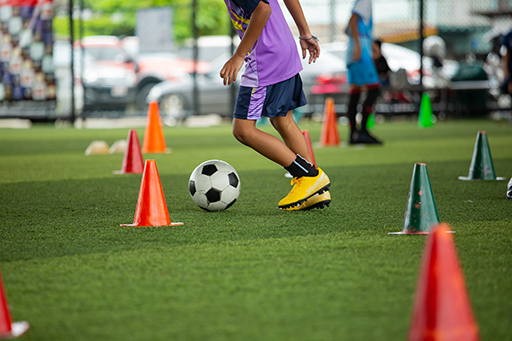2 Your experiences of transitions in sport

Most people have their first engagement with sport at school, or at school age, when they are introduced to ‘traditional’ school sports. For example, in the UK, these may include athletics, netball and football. As such, the entry phase into sport tends to occur in childhood as children ‘sample’ a range of different sports (Côté, 1999). From this initial entry phase into sport, people go on to have different relationships and experiences associated with sport whether through participation or, in some cases, as a career. What transitions have you experienced so far?
Activity 2 Your journey so far
Whether you are still involved in sport or have been in the past, reflect on the experiences you have had and consider the following questions:
- Where was your first experience of your sport?
- What motivated you to continue with it?
- Within these experiences, what would you identify as being transitions?
Discussion
While it’s common to have your first experience of sport at primary school there are also instances when you may have been introduced outside of the school environment, like Candice.
Motivations for involvement can vary and are often multi-faceted. For example, you may have noted that you played your sport because your friends did and it was fun. But it could be that you had a parent who played the sport too, or maybe you were inspired by a professional in that sport. Whatever the reason, you will have had different motivations for wanting to be involved.
Depending on what stage you are at in your sporting journey, you will have experienced different transitions. If you are only at the start of your journey, your experiences may be more limited, such as your entry into sport and perhaps moving to playing at a higher level. If, however, you have completed your sporting career, you will probably have lots of transitional experiences and may even have moved into coaching or supporting your child.
Through hearing the stories of the course authors and reflecting on your own experiences, you will be starting to see that the sporting journey is often unique to each individual and characterised by different events.
While it is often easy to identify a transitional period, the challenge can come when trying to make sense of how an athlete experiences it, as often a ‘one size fits all’ approach is too limiting. Every athlete will have different emotional and psychological reactions to their experiences. Talking to each and every athlete about their experiences is obviously one method of understanding their world, but it is also important to look more broadly at the topic of transitions in sport. One way to do this is to read the work of researchers who have examined the topic in more detail, something you will look at later in this session.
However, before you consider research within this field it is important to take a brief look at the theory that underpins the area. Developing an appreciation of relevant theory is very useful when looking at a new area, and in the case of transitions it can help you understand how and why athletes experience transitions in different ways.
